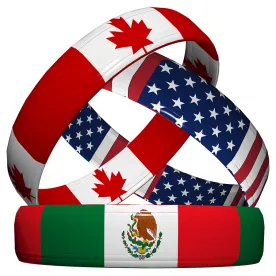As anticipated as far back as December 2016, the current administration is determined to renegotiate (or scrap) the North American Free Trade Agreement (NAFTA) in a way that helps out the United States’ manufacturing sector. One of the largest portions of that sector is the Automotive Industry. However, the Automotive Industry is also perhaps the primary example of an industry taking advantage of NAFTA to create a manufacturing industry that is truly interconnected throughout North America.
After all, the vehicle you currently drive most likely has parts that spent time in one way or another in Canada, Mexico and the United States (not to mention Asia and/or Europe). For example, with the complex, intertwined, multi-tiered automotive supply chain, a Tier 4 component may be designed in Canada, built in Mexico, shipped to a Tier 3 supplier in the United States who then incorporates it into their product (which might be designed in Japan or Korea), who then ships it to a Tier 2 supplier in Canada…and on and on until final assembly. Regardless of the current rule of origin requirements, just where is each one of those components “made”? The answer is more complex than most assume. Add to this that the list of parts subject to rule of origin analysis was devised over 20 years ago. Contemplate the technologies that did not exist in a modern automobile 20 years ago and suddenly it is apparent that hundreds of components related to fuel sources, electronics, safety, autonomous driving and more did not even exist when the parts list was made.
 Consider also that reduced costs for parts and the reduced distances of the supply chain that NAFTA allowed for have made North American made vehicles more competitive around the world. By “helping” the manufacturing sector, renegotiation of NAFTA may hurt the Automotive Industry. As already reported by Reuters, automakers are pushing back against the White House’s attempts to tighten the rules of origin. In his opening remarks to the current negotiations, U.S. Trade Representative Robert Lighthizer said, “Rules of origin, particularly on autos and auto parts, must require higher NAFTA content and substantial U.S. content. Country of origin should be verified, not ‘deemed.” The industry immediately shot back through Matt Blunt, president of the American Automotive Policy Council, saying that “We certainly think a U.S.-specific requirement would greatly complicate the ability of companies, particularly small- and medium-size enterprises, to take advantage of the benefits of NAFTA.” Flavio Volpe, president of Canada’s Automotive Parts Manufacturers Association put the industry’s perspective succinctly, “Anytime you say this list or a part of this list has to come from one specific country you’re going to hurt all three countries.”
Consider also that reduced costs for parts and the reduced distances of the supply chain that NAFTA allowed for have made North American made vehicles more competitive around the world. By “helping” the manufacturing sector, renegotiation of NAFTA may hurt the Automotive Industry. As already reported by Reuters, automakers are pushing back against the White House’s attempts to tighten the rules of origin. In his opening remarks to the current negotiations, U.S. Trade Representative Robert Lighthizer said, “Rules of origin, particularly on autos and auto parts, must require higher NAFTA content and substantial U.S. content. Country of origin should be verified, not ‘deemed.” The industry immediately shot back through Matt Blunt, president of the American Automotive Policy Council, saying that “We certainly think a U.S.-specific requirement would greatly complicate the ability of companies, particularly small- and medium-size enterprises, to take advantage of the benefits of NAFTA.” Flavio Volpe, president of Canada’s Automotive Parts Manufacturers Association put the industry’s perspective succinctly, “Anytime you say this list or a part of this list has to come from one specific country you’re going to hurt all three countries.”
One of the biggest concerns of those in Mexico and Canada is that the United States will want some sort of Made in America quota. Of course, as noted by Volpe, having such quotas or increasing the rule of origin requirements can easily have unintended consequences. For example, “If you make it too onerous, does a company or supplier say, ‘Forget about compliance. I’ll just pay the tariff.’” Anything that makes the United States Automotive Industry less competitive is bound to have the opposite impact of that intended by the White House: fewer manufacturing jobs, especially in politically important rust belt states, not to mention those in the southeast who can easily look just a little further south and see new auto manufacturing in Mexico.




 />i
/>i

